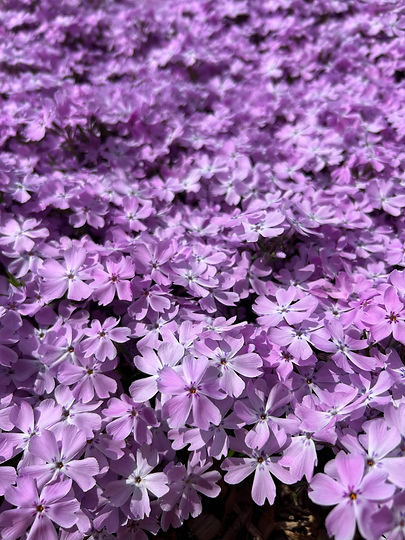
Garden Guide: Creeping Phlox
Exploring the Spectrum: Testing Varieties of Creeping Phlox for Your Spring Garden
In the world of gardening, few flowers offer the sheer resilience and beauty of
phlox. These blooms grace any garden in the early weeks of Spring with their
captivating, vibrant colors. However, with countless cultivars available, choosing
the right phlox for your garden and climate can be a daunting task. In this article,
we delve into the realm of phlox varieties that we have tested here at Arborcrest
Gardens, a 26-acre garden nestled in the heart of Boone, North Carolina. We
explore their characteristics and offer insights to help you select the perfect
blooms for your outdoor haven.
Creeping Phlox (Phlox subulata and cvs., Zones 3–9) makes an ideal ground
cover carpeting the ground with a profusion of blooms in spring. Varieties like
'Pink Sparkles' and 'Violet Pinwheels' offer hues ranging from soft pinks to
vibrant blues, adding a splash of color to rock gardens and slopes. As plants
spread, they create a massive cluster of color, almost completely concealing
any sign of leaves beneath.
But it is not just the visual appeal of phlox that makes it a star in the garden; it
is also their intoxicating fragrance that sets them apart. As the sun warms the
blooms, a sweet scent perfumes the air, attracting pollinators and beckoning
passersby to linger a little longer.
As if they couldn’t get any better; the resilience of phlox in early spring is truly remarkable. Despite facing the unpredictable whims of Mother Nature, phlox remains steadfast. Arrays of dainty blooms seem to not even notice a late frost.
Phlox subulata ‘Pink Sparkles’ offers
a dynamic beauty in the landscape.
In the early days of April in the
Southern Appalachian Mountains,
‘Pink Sparkles’ blossoms unveil in a
vibrant hue of delicate pink.
However, as the days pass and the
flowers mature, a remarkable
transformation occurs. Initially, the
petals may deepen in color,
intensifying their vibrancy and adding
layers of richness to the floral display. Yet, as time elapses, subtle shifts begin to manifest. The once vivid hues gradually soften, giving way to ethereal pastel tones creating a spectrum of pink.
Phlox ‘Violet Pinwheels’ - A
vibrant, violet variety, this deep
purple creeping phlox makes a
charming addition to any
garden. It offers a stunning
spring display of rich color and
graceful trailing foliage. Its deep
purple blooms stand out against
the green backdrop, adding an
elegant touch to the landscape. Combined with Sedum rupestre ‘Angelina,’ the deep purple hues of phlox create a striking contrast to the vibrant yellow/orange clusters of stonecrops. The rich, velvety blooms of ‘Violet Pinwheels’ intermingle with the cheerful clusters of sedum, resulting in a dynamic display of color and texture.
Phlox subulata ‘Betty’ - This miniature variety of creeping phlox is a charming
addition to any garden, forming a lush carpet of small, pastel purple blooms that
cascade over slopes and borders. Despite its petite size, this resilient plant thrives in
various conditions, spreading eagerly to suppress weeds and erosion while adding
vibrant color and texture to the landscape. Perfect for ground cover, it requires
minimal maintenance and offers maximum impact.
Phlox subulata ‘Eye Candy’ - 'Eye Candy' is a notable cultivar of the species,
characterized by its robust ground-covering habit and striking floral display. This
perennial exhibits a profusion of star-shaped, bicolor flowers, contributing to a
vibrant floral carpet during its spring bloom period. The cultivar is well-suited for
use in rock gardens, slopes, and as border edging due to its tolerance for full sun and
well-drained soils.








